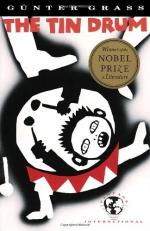|
|
The Tin Drum Chapter 45: Last Streetcar or Adoration of a Preserving Jar
Vittlar questioned Oskar about what he had in his pocket; he had seen that it was a finger. He wanted to try on the ring set with aquamarine. Oskar says that he hadn't seen Vittlar in the tree because Vittlar has a knack for blending in and looking like his surroundings. In the mental hospital, Oskar says that he asked Vittlar to bring him a transcript of the statement he made to the police regarding the finger. Oskar relates that statement in full.
Vittlar says that Oskar took the ring off the finger at his request and gave it to him; it fit Vittlar well. The two heard plane engines about to land overhead. Although they were curious as to how the plane was going to land, they did not look up at it - they called this game Leo Schugger's asceticism. Vittlar and Oskar took a cab downtown, got rid of the dog Lux, and went to Korneff's stonecutting shop. Oskar had Korneff make a plaster cast of the ring finger. Korneff promised to make him some more when the cast had hardened. Oskar treated Vittlar to dinner; speaking of the ring finger, Vittlar said he should give it to a lost and found. Oskar said no; calling it a "drumstick," he said he had been promised such a finger on the day of his birth, that Herbert Truczinski's back had foreseen the acquisition, that he had foreseen it in the cartridge case from Saspe cemetery.
Three days later Oskar and Vittlar got together again. Oskar surprised Vittlar by showing off his and Sister Dorothea's old rooms. In Dorothea's room, he had placed the ring finger in a preserving jar filled with alcohol. Oskar said he sometimes worshipped and prayed to the finger. Vittlar asked for a demonstration. Oskar agreed on the condition that Vittlar transcribe the prayer. In the prayer, Oskar described his relationship to and the physical traits of Sister Dorothea - he knew the finger had belonged to her, although he denied killing her and that he never actually saw her face. Vittlar believes him, citing Oskar's sheer devotion to the finger. Vittlar went on tour with Oskar to Western Germany, and Oskar paid Vittlar a salary to do so. Oskar declined offers to continue traveling abroad; he did not want, he says, to get caught up in the "international rat race."
Vittlar and Oskar would spend time downtown in Düsseldorf. One Friday night they stood together downtown, watching the last streetcars pull into the station. A few cars were left outside and not parked in a barn - Oskar and Vittlar nodded to each other, then climbed into a car. Vittlar took the driver's seat and as they pulled out, Oskar commended him on his driving. Oskar had them drive in the direction of The Lion's Den dance hall. Three men were sitting on the tracks, and Vittlar cried "All Aboard" as two of the men, wearing green hats with black arm bands, dragged the third man onto the streetcar. The two suited men slapped the man and made him whimper. Oskar inquired as to what the man had done. The third man turned out to be Victor Weluhn, the man who had lost his glasses in the battle for the Polish Post Office in Danzig, then fled to escape arrest. The two uniformed men had an execution order for Welhun, dated 1939. They had been on the man's trail nonstop for a decade.
Oskar told Vittlar that they had to save Victor, for he was nearsighted and would be looking in the wrong direction when the men shot him. The men stayed on until the last stop. The chosen execution sight was the same fence along which Oskar had met Vittlar. The men tied Victor to the same apple tree from which Vittlar had first seen Oskar. Oskar gave Vittlar his briefcase containing his preserving jar, and took his drum out from under his shirt. When talking did not work to save Victor, Oskar began desperately to drum. He drummed out a rhythm containing "Poland is not yet lost; while we live, Poland cannot die" - part of the Polish national anthem. Suddenly a brigade of horsemen emerged from the ground, carrying the red and white banners of the Polish cavalry. They glided along over the field and swept up Victor and his executioners and disappeared off into the east.
Topic Tracking: Red & White 16
Vittlar told Oskar his performance was a triumph. Oskar said he'd had too many triumphs, what he needed was a failure. Vittlar said he was being arrogant, that he would do anything to be famous like Oskar. Oskar laughed, rolling on the ground. He told Vittlar to take his briefcase containing the jar with the ring finger. He told him to take it to the police and turn him in as Sister Dorothea's killer; that would get his name in the papers.
Thus ended Vittlar's statement - Oskar says he told himself to sleep a little before the police got to him. He awoke in the field in broad daylight with a cow licking his face. Oskar told himself to flee.




